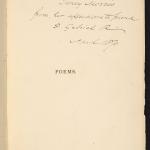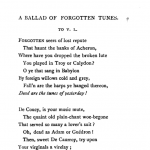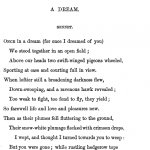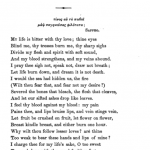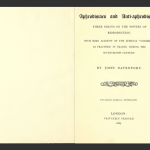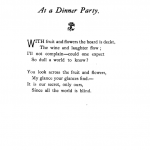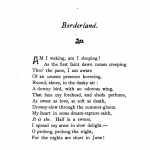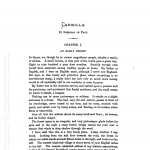All items
Page images include only pages of prose essay which contain the poem.
"Jenny" is a lengthy, dramatic monologue about a woman who is working as a prostitute narrated by a male customer. The narrator romanticizes and sympathizes with the role of prostitute throughout this poem. The excerpt below are stanzas 22-24 of the poem. In this portion of the poem the narrator comments women's innocence loss as well as the world of lust people reside in (which he is also shamefully a part of and that no one seems to be able to escape). It is also interesting to note that the first edition of Rossetti's Poems held within the British Library contains an inscription Rossetti made to Jane Morris, who was the muse of Rossetti as well as her husband William Morris. Rossetti and Jane Morris were involved in an affair over many years.
Raffalovich published the following poem during the same period where he ran a salon in London. It was here where Raffalovich met his life-long partner, John Gray, through his friend Oscar Wilde. This poem describes the narrator falling in love with a man, an act considered both illegal and immoral at the time. The abab rhyme scheme creates an innocent sing-song effect, while the emphasis on the pleasures of Love create juxtaposition with the ideas of Vice, Crime, and Sin.
In this Shakespearian sonnet, Raffalovich is condemning other men in British society who judged or wished harm upon him and his lover due to their sexuality. The poem expresses that the two lovers have done nothing to harm anyone and that he chooses living how they are happiest over the approval of others.
Victorian writer, Amy Levy, wrote "A Ballad of Religion and Marriage" during a period where a woman's value was based almost solely upon her marital status. This piece challenges tradition and gender roles in order to show Levy's hope for a future where people aren't judged based upon their religious beliefs or their marital status.
Amy Levy published this poem as a part of her collection A London Plane-tree and other Verse . The poem celebrates the nights she gets to spend sleeping next to her love, and laments how short the summer nights are for they give her less time with her beloved.
"Carmilla" is a Gothic novella that was originally published as a serial in the literary magazine The Dark Blue. It tells the story of an eighteen-year-old girl named Laura and her house guest, Carmilla. Laura is instantly drawn to the beautiful and cryptic girl, but despite her insistent prodding, Carmilla refuses to tell Laura about her past. Carmilla seduces Laura through her words and actions, and the girls soon develop an intimate relationship. Le Fanu demonstrates the sexual tension between the two girls in the following passages.



